The present crisis within the Southern Baptist Convention over how to handle allegations of sexual abuse isn’t Ronnie Floyd’s first experience responding to such sensitive matters. Before taking the helm of the SBC’s powerful Executive Committee, Floyd was pastor of an Arkansas church touched by the scandal of reality TV star Josh Duggar.
And ironically, as Floyd and the SBC Executive Committee this week were debating once again whether to allow a full investigation of their own potential liability in covering up or denying sexual abuse cases within the SBC, Duggar was appearing in an Arkansas courtroom to contest charges of possessing child pornography — a continuation of a high-profile case covered endlessly in People magazine and other celebrity news outlets.
Duggar, now 33, came to national fame along with his family through the reality TV show 19 Kids and Counting. He is the eldest of Michelle and Jim Bob Duggar’s 19 children. The TV show was cancelled in 2015 after revelations that Josh Duggar had molested multiple underage girls, including four of his sisters. USA Today named this one of the “10 Big Scandals of 2015.”
Duggar family connections to Floyd’s church
Prior to this scandal, Ronnie Floyd was pastor to some of the Duggar family at Cross Church in Springdale and Rogers, Ark., which also put him in the spotlight as media descended on the northwest Arkansas community in 2015. At the time, Floyd also served as president of the SBC, an elected position, not a staff position. And Cross Church was the largest church in the state of Arkansas.
“Things like (the scandal) have happened before and will happen again.”
At the time the abuse story broke, the extended Duggar family reportedly were not active members of the church, although daughter Jill Duggar Dillard and her husband, Derick, were active members and got married there in June 2014. By other media accounts, various members of the family have had connections to the church across time. Michelle and Jim Bob were married at the church before it was renamed Cross Church from its origins as First Baptist Church of Springdale, Ark.
By 2015, Floyd had served the Arkansas church across four decades and had grown it to a multi-campus enterprise with thousands of members. He was a well-known figure in the region and within the SBC nationally. Thus, People magazine sought a comment from him.
In May 2015, Floyd told People he was surprised by the scandal: “All of us were surprised by the news because … their reputation in Arkansas is that they are a very Christian family.”
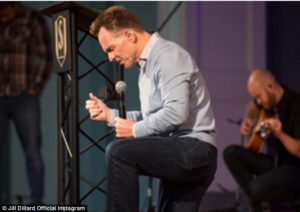
Screen cap from video of Ronnie Floyd praying at Cross Church the Sunday after news of Josh Duggar’s molestation charges were made known. This image was shared on social media by one of Josh’s sisters, Jill.
Floyd also preached a message of forgiveness: “Everyone does wrong, and what was wrong was very wrong as to what was testified to and it’s completely unacceptable. But I’m thankful, whether it’s him or any other one, that I serve a God who can forgive everything.”
Not to worry, though, Floyd told People, which quoted him as saying his “evangelical Christian ministry is alive and well” despite the scandal. “Things like (the scandal) have happened before and will happen again.”
The Sunday before the interview, People reported that Floyd gave a sermon in which he told his parishioners, “You dads, make sure you raise your sons around men who are manly.” And in which he derided Caitlyn Jenner, who at the time was publicly transitioning from male to female. “Gender is not fluid,” Floyd preached.
Jill Duggar Dillard used social media to share a link to that sermon, encouraging her friends and followers to listen to Floyd.
Floyd’s role at the Executive Committee
In 2019, Floyd left his 33-year pastorate in Arkansas to take on the role of president of the SBC Executive Committee. His predecessor there, Frank Page, had resigned due to a “morally inappropriate relationship in the recent past.”
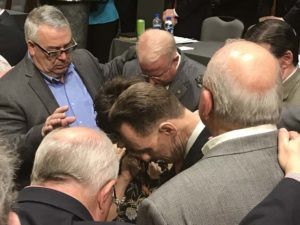
Members of the SBC Executive Committee gather around Ronnie Floyd and his wife, Jeana, after his election as the agency’s president and chief executive officer in 2019. (Photo courtesy of Baptist Standard and Ken Camp)
Floyd was hailed by other SBC leaders as an exemplary choice. For example, then-SBC President J.D. Greear spoke glowingly to Baptist Press about Floyd’s selection: “This is a crucial moment for Southern Baptists, and I am excited to work alongside Ronnie Floyd as he leads the Executive Committee forward. … He is a man of prayer and a man of action; a man of prudence and man of boldness. He is a gifted leader who I believe will keep the gospel above all.”
This week, Greear was among those publicly expressing disappointment and frustration with Floyd and the Executive Committee.
Southeastern Baptist Theological Seminary President Danny Akin, who now is outspoken about perceived leadership failures at the Executive Committee, also lauded Floyd’s election back in 2019: “Ronnie Floyd is one of the most gifted and effective leaders I know. … He is tireless, focused, wise and visionary. He also is a man of impeccable integrity. I believe he is the right man to lead the Executive Committee of the Southern Baptist Convention in these challenging days that face our convention.”
Within SBC life, the Executive Committee functions both as its own entity with a staff executive and board of trustees but also as a coordinating body for the other 10 SBC entities. It is the central organization receiving and disbursing hundreds of millions of dollars in Cooperative Program and designated giving.
Major influence of staff
As with any nonprofit organization, the trustees and officers of the Executive Committee hold ultimate authority over governance, but it is staff who lead the organization day to day and give leadership to the board’s work.
That’s where critics of Floyd — and there are a growing number of these — are now focusing attention.
One of the sharpest such critiques appeared Sept. 30 on the website SBC Voices, which is an independent group of SBC pastors who provide a running commentary on convention matters from a center-right perspective.

Jay Adkins
A post written by Jay Adkins, pastor of First Baptist Church of Westwego in the metro New Orleans area, singled out Floyd’s leadership as the root problem. When the Executive Committee met Sept. 21 to consider whether to waive attorney-client privilege in the sexual abuse investigation, more than 100 days had passed since convention messengers adopted the motion to create the task force and instructed the Executive Committee to waive attorney-client privilege.
Adkins wrote: “Why was this past week’s EC meeting such a colossal failure? Why was the board unable to fulfill these basic requirements set forth by approximately 15,000 Southern Baptists? The answer is very clearly a failure of leadership.
“To put a finer point on it, they were failed by Dr. Floyd,” Adkins added. “Trustees are not employees. They are charged with giving oversight to SBC institutions, but they do not carry out the work of the entity. In a very real sense, the members of the EC’s board of trustees were put in an impossible position this week and last by their own entity’s leadership. … It is inexcusable that the roughly 80 trustees who attended this week’s meeting walked in the door on Monday without an agreement in place between the EC and the task force. In a two-day meeting, the board was in no position to work out the terms of an agreement.”
“The answer is very clearly a failure of leadership.”
He concluded: “On an issue so important, Southern Baptists were failed by their leaders. Not just EC trustees, but all of us were failed. And the failure in this case only leads to further concern about the substance of the allegations that spurred the investigation in the first place. … After these last few days, what confidence can Southern Baptists have that actual abuse cases have not been mishandled? And without the waiver of attorney-client privilege, what critical information about the EC’s actions will remain unknown to the countless Southern Baptists who support this investigation?”
An unapproved news release?
One of the additional tensions at play is that the Executive Committee — which is both the subject of the sexual abuse investigation and the entity now trying to impede it — also controls the denominational news service, Baptist Press. On paper, there are firewalls in place, with the Executive Committee having a media spokesperson apart from BP, but ultimately Ronnie Floyd signs the paychecks of BP staff members.

Hannah Kate Williams
Six weeks ago, sexual abuse survivor Hannah Kate Williams filed a federal lawsuit accusing the SBC Executive Committee, along with other SBC entities and individual leaders, of a conspiracy to cover up allegations of sexual abuse within the denomination and to harass victims like her — the very heart of what the SBC Sexual Abuse Task Force has been tasked with investigating. To date, no mention of the lawsuit has appeared in Baptist Press.
Thus it was adding insult to injury for sexual abuse survivors when on Thursday, Sept. 30, an unnamed “spokesman” for the Executive Committee sent out an explanation that the impasse between the Executive Committee and the task force isn’t nearly as bad as it appears.
It said “too many of the statements” circulating about the impasse “reflect disinformation, half-truths and mischaracterizations of the motives and actions of the Executive Committee.” Within the committee, the spokesman asserted, “there is no attempt to defy the messengers or hide information from investigators.”
“There is no attempt to defy the messengers or hide information from investigators.”
And then, referencing the potential of the SBC losing liability insurance coverage if attorney-client privilege is waived for the investigation and wrongdoing is found, the spokesman said: “Those who appeal alone to divine intervention to protect the convention also wear safety belts when they drive and insure their vehicles and their homes.”
Within minutes of this document being shared on social media, elected members of the Executive Committee spoke up to say they had never seen this statement before and that it did not in any way express their beliefs. And sexual abuse victims and their advocates demeaned the statement as laughable.
Despite these protests about an apparently unapproved statement being released by an unnamed spokesperson, Baptist Press quoted the unattributed statement in full in an afternoon story.
Who’s in charge here?
Thus the question turned to who was behind the release of this statement. And that question goes to the heart of the current crisis: Who really is pulling the strings to cause Executive Committee trustees to defy the will of convention messengers and upend Southern Baptist polity?
By some accounts, it’s Floyd as president. By other accounts, it’s the team of lawyers. The least-mentioned option is the trustee officers.
That group includes Floyd as president; Rolland Slade of El Cajon, Calif., chairman; Stacy Bramlett of Collierville, Tenn., newly elected vice chair; Joe Knott of North Carolina, secretary; plus the chairs of four standing committees.
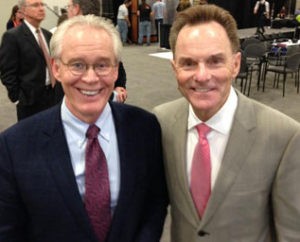
Barry McCarty with Ronnie Floyd when Floyd was president of the SBC.
Slade has had the unenviable task of presiding over tumultuous meetings the last two weeks. The person who is seen as much as Slade at those meetings, however, is not an elected officer. It is Barry McCarty, a former Disciples of Christ pastor who now identifies as a Southern Baptist. McCarty has been employed by the convention for parliamentary services since 1986, in the heat of the “conservative resurgence.”
At the public meetings of the Executive Committee, such as Sept. 21, McCarty is seen standing over the shoulder of the trustee chairman giving step-by-step instructions on proper procedure, including what motions or amendments are in order or out of order. He wields significant influence.
But based on recent comments by Executive Committee members and Sexual Abuse Task Force members, the persons with the most power beyond Floyd are mainly invisible to public view. They are the lawyers.
Meet the Executive Committee’s legal team
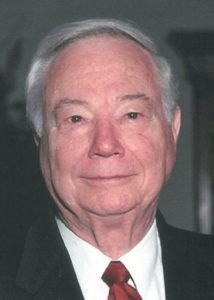
Jim Guenther
Foremost among the hired legal help is Jim Guenther and his colleagues from the Nashville firm Guenther, Jordan and Price. Guenther has served as SBC legal counsel since 1966. He has guided the denomination through intense battles before, including the schism that ran from 1979 to 2000.
In a recent interview with the Baptist & Reflector of Tennessee, Guenther was asked about a question raised by a messenger to the June annual meeting who wondered if the attorney for the SBC Executive Committee also should be the attorney for the convention, because that could represent a conflict of interests.
“Whether it should be the same lawyer is a matter for someone else to decide, but professionally I do not see it as a conflict of interests,” he said. “The goals and interests of the Southern Baptist Convention and the Executive Committee are identical.”
Except now those goals appear to be quite different, with the Executive Committee refusing to take an action convention messengers told them to take. For now, it’s impossible for the convention to sue its Executive Committee to force a resolution, because the convention exists only two days a year at the annual meeting.

Harriet Miers
Due to the specialized nature of the current conflict, however, the Executive Committee has brought in additional legal representation from the Dallas law firm Locke Lord. Those two Dallas attorneys have different legal and political pedigrees, but both appear to be united in advising the Executive Committee never to waive attorney-client privilege as the convention has demanded.
Harriet Miers has longtime ties to Barry McCarty, the parliamentarian, who previously was preaching pastor at Valley View Christian Church in Dallas, where Miers joined as a new evangelical Christian and became deeply involved in the church’s mission and ministries.
Raised nominally Roman Catholic, Miers years ago converted to evangelical Christianity at Valley View Christian Church.
Miers gained national attention in 2007 when she withdrew her nomination by then-President George W. Bush to a seat on the U.S. Supreme Court, where she would have replaced retiring Justice Sandra Day O’Connor. Her nomination faced bipartisan objections for a variety of reasons, including opposition from the Religious Right.
Miers is a well-known conservative and Republican listed by The Federalist Society as a member of its litigation and public policy sections. She returned to the firm now known as Locke Lord after the failed Supreme Court nomination. For seven years prior, she had worked in the Bush White House.
She also has a unique perspective on the barriers females face in a male-dominated world.
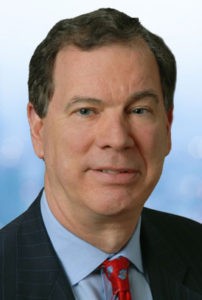
Paul Coggins
In 1972, she was the first woman hired at the Dallas firm then known as Locke Purnell Boren Laney and Neely. She also became the first woman to lead the firm in 1996. She was the first woman elected president of the Dallas Bar Association and then became the first woman to serve as president of the Texas State Bar.
Her colleague from Locke Lord, who also is advising the SBC Executive Committee, is Paul Coggins, who serves as co-chair of Locke Lord’s White Collar Criminal Defense and Internal Investigations Practice Group. He previously was the U.S. Attorney for the Northern District of Texas from 1993-2001, nominated by then-President Bill Clinton.
Among other legal specialties, he develops compliance and ethics programs for corporations and other business entities.
Related articles:
SBC faces a test of its governance with tug-of-war over sexual abuse investigation | Analysis by Mark Wingfield
SBC Executive Committee hires a firm to investigate itself and report findings to itself


